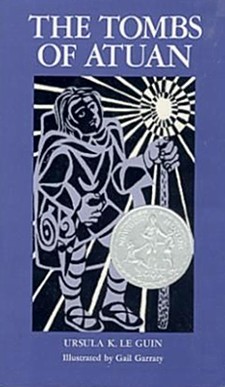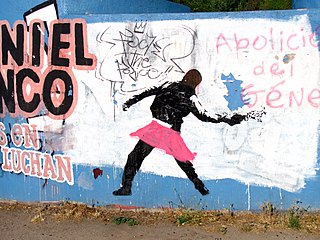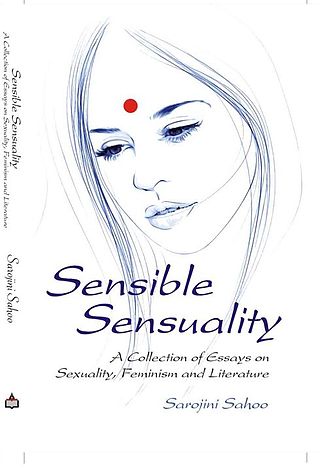Related Research Articles
Feminist science fiction is a subgenre of science fiction focused on such feminist themes as: gender inequality, sexuality, race, economics, reproduction, and environment. Feminist SF is political because of its tendency to critique the dominant culture. Some of the most notable feminist science fiction works have illustrated these themes using utopias to explore a society in which gender differences or gender power imbalances do not exist, or dystopias to explore worlds in which gender inequalities are intensified, thus asserting a need for feminist work to continue.
Science fiction and fantasy serve as important vehicles for feminist thought, particularly as bridges between theory and practice. No other genres so actively invite representations of the ultimate goals of feminism: worlds free of sexism, worlds in which women's contributions are recognized and valued, worlds that explore the diversity of women's desire and sexuality, and worlds that move beyond gender.

Joanna Russ was an American writer, academic and feminist. She is the author of a number of works of science fiction, fantasy and feminist literary criticism such as How to Suppress Women's Writing, as well as a contemporary novel, On Strike Against God, and one children's book, Kittatinny. She is best known for The Female Man, a novel combining utopian fiction and satire, and the story "When It Changed".

Ursula Kroeber Le Guin was an American author. She is best known for her works of speculative fiction, including science fiction works set in her Hainish universe, and the Earthsea fantasy series. Her work was first published in 1959, and her literary career spanned nearly sixty years, producing more than twenty novels and over a hundred short stories, in addition to poetry, literary criticism, translations, and children's books. Frequently described as an author of science fiction, Le Guin has also been called a "major voice in American Letters". Le Guin said she would prefer to be known as an "American novelist".

The Dispossessed is a 1974 anarchist utopian science fiction novel by American writer Ursula K. Le Guin, one of her seven Hainish Cycle novels. It is one of a small number of books to win all three Hugo, Locus and Nebula Awards for Best Novel. It achieved a degree of literary recognition unusual for science fiction due to its exploration of themes such as anarchism and revolutionary societies, capitalism, utopia, individualism, and collectivism.
The Hainish Cycle consists of a number of science fiction novels and stories by Ursula K. Le Guin. It is set in a future history in which civilizations of human beings on planets orbiting a number of nearby stars, including Terra ("Earth"), are contacting each other for the first time and establishing diplomatic relations, and setting up a confederacy under the guidance of the oldest of the human worlds, peaceful Hain. In this history, human beings did not evolve on Earth but were the result of interstellar colonies planted by Hain long ago, which was followed by a long period when interstellar travel ceased. Some of the races have new genetic traits, a result of ancient Hainish experiments in genetic engineering, including people who can dream while awake, and a world of hermaphroditic people who only come into active sexuality once a month, not knowing which sex will manifest in them. In keeping with Le Guin's style, she uses varied social and environmental settings to explore the anthropological and sociological outcomes of human evolution in those diverse environments.

The Tombs of Atuan is a fantasy novel by the American author Ursula K. Le Guin, first published in the Winter 1970 issue of Worlds of Fantasy, and published as a book by Atheneum Books in 1971. It is the second book in the Earthsea series after A Wizard of Earthsea (1969). The Tombs of Atuan was a Newbery Honor Book in 1972.

"The Girl Who Was Plugged In" is a science fiction novella by American writer James Tiptree, Jr. It won the Hugo Award for Best Novella in 1974.

The Birthday of the World and Other Stories is a collection of short fiction by American writer Ursula K. Le Guin, first published in March, 2002, by HarperCollins. All of the stories, except "Paradises Lost", were previously published individually elsewhere. The story which lends its name to the title of the collection was the most recent publication, in 2000. Only these two stories are not set on planets of the Ekumen.

Postgenderism is a social, political and cultural movement which arose from the eroding of the cultural, psychological, and social role of gender, and an argument for why the erosion of binary gender will be liberatory.
Feminist anthropology is a four-field approach to anthropology that seeks to transform research findings, anthropological hiring practices, and the scholarly production of knowledge, using insights from feminist theory. Simultaneously, feminist anthropology challenges essentialist feminist theories developed in Europe and America. While feminists practiced cultural anthropology since its inception, it was not until the 1970s that feminist anthropology was formally recognized as a subdiscipline of anthropology. Since then, it has developed its own subsection of the American Anthropological Association – the Association for Feminist Anthropology – and its own publication, Feminist Anthropology. Their former journal Voices is now defunct.
Gender has been an important theme explored in speculative fiction. The genres that make up speculative fiction, science fiction, fantasy, supernatural fiction, horror, superhero fiction, science fantasy and related genres, have always offered the opportunity for writers to explore social conventions, including gender, gender roles, and beliefs about gender. Like all literary forms, the science fiction genre reflects the popular perceptions of the eras in which individual creators were writing; and those creators' responses to gender stereotypes and gender roles.
Sandra Lee Bartky was a professor of philosophy and gender studies at the University of Illinois at Chicago. Her main research areas were feminism and phenomenology. Her notable contributions to the field of feminist philosophy include the article, "Toward a Phenomenology of Feminist Consciousness". Sandra Lee Bartky died on October 17, 2016, at her home in Saugatuck, Michigan at age 81.

The Left Hand of Darkness is a science fiction novel by the American writer Ursula K. Le Guin. Published in 1969, it became immensely popular, and established Le Guin's status as a major author of science fiction. The novel is set in the fictional Hainish universe as part of the Hainish Cycle, a series of novels and short stories by Le Guin, which she introduced in the 1964 short story "The Dowry of Angyar". It was fourth in sequence of writing among the Hainish novels, preceded by City of Illusions, and followed by The Word for World Is Forest.
The role of women in speculative fiction has changed a great deal since the early to mid-20th century. There are several aspects to women's roles, including their participation as authors of speculative fiction and their role in science fiction fandom. Regarding authorship, in 1948, 10–15% of science fiction writers were female. Women's role in speculative fiction has grown since then, and in 1999, women comprised 36% of the Science Fiction and Fantasy Writers of America's professional members. Frankenstein (1818) by Mary Shelley has been called the first science fiction novel, although women wrote utopian novels even before that, with Margaret Cavendish publishing the first in the seventeenth century. Early published fantasy was written by and for any gender. However, speculative fiction, with science fiction in particular, has traditionally been viewed as a male-oriented genre.
Gender essentialism is a theory which attributes distinct, intrinsic qualities to women and men. Based in essentialism, it holds that there are certain universal, innate, biologically based features of gender that are at the root of many of the group differences observed in the behavior of men and women.
The anthropologist Leon E. Stover says of science fiction's relationship to anthropology: "Anthropological science fiction enjoys the philosophical luxury of providing answers to the question "What is man?" while anthropology the science is still learning how to frame it". The editors of a collection of anthropological SF stories observed:
Anthropology is the science of man. It tells the story from ape-man to spaceman, attempting to describe in detail all the epochs of this continuing history. Writers of fiction, and in particular science fiction, peer over the anthropologists' shoulders as the discoveries are made, then utilize the material in fictional works. Where the scientist must speculate reservedly from known fact and make a small leap into the unknown, the writer is free to soar high on the wings of fancy.

Sensible and Sensuality is a collection of essay by Indian feminist writer Sarojini Sahoo. Published in 2010, the book contains the author's view on feminism. Sahoo is a key figure and trend-setter of feminism in contemporary Indian literature. She has been listed among 25 exceptional women of India by Kindle English magazine of Kolkata. For Sahoo, feminism is not a "gender problem" or confrontational attack on male hegemony and, as such, differs from the feminist views of Virginia Woolf or Judith Butler.

"Coming of Age in Karhide" is a science fiction short story by Ursula K. Le Guin, first published in 1995. The story is set on the fictional planet of Gethen, the same as Le Guin's 1969 novel The Left Hand of Darkness, and is a part of Le Guin's Hainish cycle. The story explores themes of growing into adulthood on a planet where individuals have no fixed gender identity. Reviewers stated that the story went further than Left Hand in its exploration of gender and sexuality, and was a "quietly feminist" work. It was also described as lacking the "dizzying impact" of Left Hand. In 2002, it was anthologized in the volume The Birthday of the World, along with many other stories exploring marriage and sexual relationships.
A gender novel is a genre of novel that features gender, or the concept of gender, as a central theme to the plot of the novel. The concept of gender may be used to initiate debate regarding gender stereotypes, gender equality or the reversal of gender roles within books. This term is synonymous with gendered fiction. Gender novels may be categorized not only under the genre of gendered fiction but crime, novel of manners, romance novels, western novels, fantasy, and science-fiction.
Sarah Antoinette LeFanu is a Scottish author and academic.
References
- 1 2 "Bibliography: The Matter of Seggri". Isfdb.org. 1996-04-30. Retrieved 2015-12-17.
- ↑ "Chapter 17: "Solitude" and "The Matter of Seggri"". Science Fiction Research Association. Archived from the original on July 11, 2015. Retrieved 2015-12-17.
- ↑ Wolfe, Gary K. (2012-12-23). "Gary K. Wolfe reviews Ursula K. Le Guin". Locus Online Reviews. Locus Magazine. Retrieved 2015-12-17.
- ↑ Shippey, Tom (2012-11-22). "Outer Space, Inner Lands". Where on Earth. Wall Street Journal. Retrieved 2015-12-17.
- ↑ Freedman, Carl (2000). "Science Fiction and the Triumph of Feminism". Science Fiction Studies: 278–289. Retrieved 15 April 2015.
- ↑ Baker-Cristales, Beth (2012). "Poiesis of Possibility: The Ethnographic Sensibilities of Ursula K. Le Guin". Anthropology and Humanism. 37: 15–25. doi:10.1111/j.1548-1409.2012.01105.x.
- ↑ Diamond, Irene; Quinby, Lee (1988). Feminism & Foucault: reflections on resistance . Northeastern University Press. p. 63. ISBN 978-1-55553-033-4 . Retrieved 11 April 2015.
- ↑ Hollinger, Veronica (1999). "(Re)reading Queerly: Science Fiction, Feminism, and the Defamiliarization of Gender". Science Fiction Studies: 23–38. Retrieved 15 April 2015.
- ↑ Macellino, William (2009). "Shadows to Walk: Ursula Le Guin's Transgressions in Utopia". Journals of American Culture. 32 (3): 203–213. doi:10.1111/j.1542-734X.2009.00711.x.